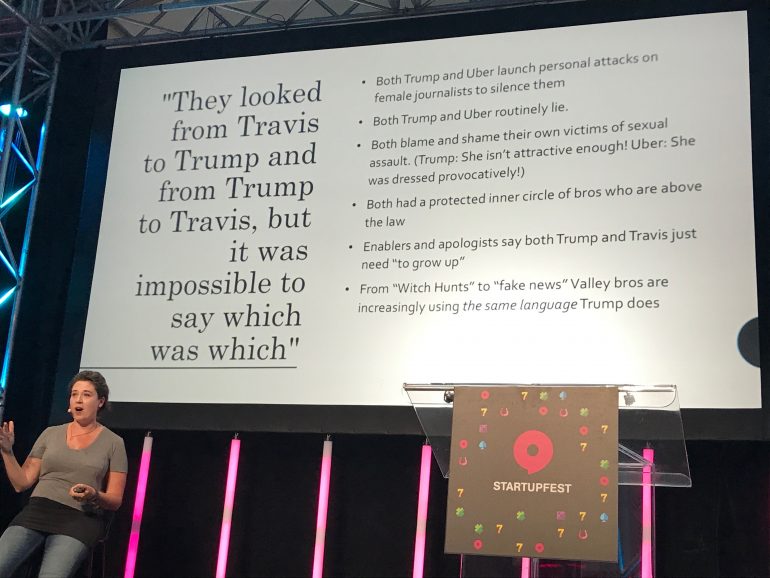The Silicon Valley bro culture bubble has burst, and Sarah Lacy wants you to know it.
Award-winning journalist, founder of PandoDaily, and former senior editor at TechCrunch, Lacy has been reporting on the Silicon Valley tech scene for more than fifteen years. She has written two critically-acclaimed books about it.
She wants the men of Silicon Valley to be terrified right about now, because the resurgence of feminism resulting from the behaviour of President Trump has finally given women a sense of urgency. Women are willing to risk their own careers to call out the gross sexism that pervades Silicon Valley and tech culture in general. The beginning of the end is here.
“What we’re seeing is not just greed. Toxic masculinity is superseding data.”
– Sarah Lacy, PandoDaily founder
Speaking at Startupfest in Montreal on Friday, Lacy called attention, in the most vehement way, to the confusion of the pursuit of money and power with the pursuit of masculinity that you see across Silicon Valley.
This “toxic masculinity” is now impossible to ignore. We’ve reached a point where despite what many men would like to say and think, the world at large is aware of the sexism, sexual harassment, and overall “shitty behaviour” coming out of tech companies in the Valley.
“80 percent of female VCs say they have witnessed sexism in tech,” said Lacy, “Only 28 percent of men did. So these conversations that have been happening in the last couple of weeks, where people say ‘well, this isn’t happening at my firm’ or ‘I’ve never seen this’ or ‘these must be outliers’ or ‘it can’t really be this bad’… look at that stat. It is happening even if you’re not seeing it, and by the way, there’s a race element to this too.”
Lacy argues that Silicon Valley has become a place where people “brag about law breaking,” where the culture of disruption has led to founders who are willing to jeopardize the future of their companies in order to get the headline, “so [the rise of toxic masculinity] isn’t a surprise if that’s how you’re building companies” she said. “Grabbing, possessing, and putting women in their place fits that psychological pattern.”
“It’s all been about this big man syndrome, proving this precarious masculinity of ‘look how big and bad and awesome and risk-taker and bro-ey and baller I am,’ to borrow Uber’s favourite word,” Lacy continued.
Hands down the best talk of #StartupFest. @sarahcuda slays w data, insights & candour on Silicon Valley's morality crash. Standing ovation. pic.twitter.com/bM8CA4hLSZ
— Jen Couldrey (@jencouldrey) July 14, 2017
This behaviour, of course, goes against all of the data. We have read the reports that state that working more than 50 hours a week leads to declines in productivity. We have all seen the stats about diversity driving innovation, and the advantages of female leadership in companies. And yet this idea that “you have to be 24/7 crushing it,” persists, said Lacy, and this keeps a lot of women, in particular mothers, out of the industry.
Data also shows that companies with female founders perform better, as do female VCs.
“That’s particularly shocking,” said Lacy, “Because a lot of female VCs are ghettoized into sectors like healthcare, or ecommerce, or corporate venture capital groups, which have the worst proceeds overall.”
“If you’re in your forties, you’re not in your young misogyny phase that all men go through. You are a misogynist.”
While female VCs have been outperforming men, the number of firms led by female VCs has been reduced by half, Lacy continued. “There are fewer women getting the job, even though they are statistically creating the best returns.”
“What we’re seeing is not just greed. Toxic masculinity is superseding data.”
There is hope, however. Trump has energized feminism in the US, and we’re now seeing the most cohesive and unsplintered move for women’s rights in history. As more women speak out, more scandals will force the Travis Kalanicks of the world out of their companies, and the blinders will come off for the rest of them.
So how men can help? “It’s not by co-opting the conversation and trying to use the same rational factor ego of wanting to compare valuations with suddenly trying to compare ‘wokeness,’” said Lacy, alluding to a popular term that describes awareness of social injustices. Believe women when they speak out, for one. And don’t hire known sexual predators, Lacy continued. She also warned against believing or congratulating someone for their apologies as “so far they’ve tried to walk it back every single time.”
“White men have to stop getting endless chances,” Lacy concluded. “If you’re in your forties, you’re not in your young misogyny phase that all men go through. You are a misogynist and you cannot work in this industry.”


